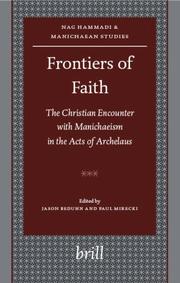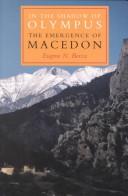| Listing 1 - 8 of 8 |
Sort by
|
Article
Abstract | Keywords | Export | Availability | Bookmark
 Loading...
Loading...Choose an application
- Reference Manager
- EndNote
- RefWorks (Direct export to RefWorks)
Book
Abstract | Keywords | Export | Availability | Bookmark
 Loading...
Loading...Choose an application
- Reference Manager
- EndNote
- RefWorks (Direct export to RefWorks)
Object
Abstract | Keywords | Export | Availability | Bookmark
 Loading...
Loading...Choose an application
- Reference Manager
- EndNote
- RefWorks (Direct export to RefWorks)
Numismatics. --- Archelaus I. --- Archelaos --- Coins.
Book

Year: 1829 Publisher: Parisiis : Bruxellis : Parisiis : apud Méquignon-Havard, apud eumdem, e typographeo Decourchant,
Abstract | Keywords | Export | Availability | Bookmark
 Loading...
Loading...Choose an application
- Reference Manager
- EndNote
- RefWorks (Direct export to RefWorks)
Archelaus, --- Dionysius Alexandrinus, --- Gregorius Thaumaturgus,


ISBN: 9789004161801 9004161805 Year: 2007 Volume: 61 Publisher: Leiden Brill
Abstract | Keywords | Export | Availability | Bookmark
 Loading...
Loading...Choose an application
- Reference Manager
- EndNote
- RefWorks (Direct export to RefWorks)
Manichaeism --- Christianity and other religions --- Relations --- Christianity --- Controversial literature --- History and criticism --- Hegemonius. --- Acta Archelai --- GOSAA.01.03.03 --- 273.21 --- Dualism (Religion) --- Philosophy, Ancient --- Syncretism (Christianity) --- Religions --- Manichaeism. --- Christianity. --- AUGUSTINUS. Biografie. Relaties en bronnen. Manicheisme – Neo-manicheïsme --- Manicheïsme --- History --- Acta Archelai. --- 273.21 Manicheïsme --- Controversial literature&delete& --- Relations&delete& --- Archelaus --- Manichéens --- Hegemonius. - Acta Archelai.

ISBN: 1281936529 9786611936525 9047421531 9789047421535 9789004161801 9004161805 9781281936523 6611936521 Year: 2007 Publisher: Leiden Boston Brill
Abstract | Keywords | Export | Availability | Bookmark
 Loading...
Loading...Choose an application
- Reference Manager
- EndNote
- RefWorks (Direct export to RefWorks)
Taking as their common subject the key early Christian anti-Manichaean work, the Acts of Archelaus ( Acta Archelai ), the contributors to this volume offer a systematic exploration of what the text has to tell us about inter-religious contact, conflict, and comprehension at a crucial moment in religious history: the encounter between Christianity and Manichaeism along the political and cultural frontier zone of West Asia in the early fourth century CE. The contributions examine the text's structure, apologetic and polemical strategies, and possible sources, and through these analyses challenge received notions of ‘orthodoxy’ and ‘heresy’ in the mutual construction of identity that took place between these two claimants to the Christian heritage.
Acta Archelai (Hegemonius) --- Manicheïsme. --- Vroege christendom. --- Christianity and other religions --- Manichaeism --- Manichaeism. --- Christianity --- Syncretism (Christianity) --- Religions --- Dualism (Religion) --- Philosophy, Ancient --- Christianity. --- History and criticism. --- Relations --- History --- Hegemonius. --- Controversial literature --- Manichaeism - Early works to 1800 --- Christianity and other religions - Manichaeism --- Manichaeism - Relations - Christianity --- Manichaeism - Controversial literature - History and criticism --- Archelaus --- Manichéens --- Hegemonius. - Acta Archelai.

ISBN: 0691055491 0691215944 9780691055497 0691008809 Year: 1990 Publisher: Princeton : Princeton University Press,
Abstract | Keywords | Export | Availability | Bookmark
 Loading...
Loading...Choose an application
- Reference Manager
- EndNote
- RefWorks (Direct export to RefWorks)
In tracing the emergence of the Macedonian kingdom from its origins as a Balkan backwater to a major European and Asian power, Eugene Borza offers to specialists and lay readers alike a revealing account of a relatively unexplored segment of ancient history. He draws from recent archaeological discoveries and an enhanced understanding of historical geography to form a narrative that provides a material-culture setting for political events. Examining the dynamics of Macedonian relations with the Greek city-states, he suggests that the Macedonians, although they gradually incorporated aspects of Greek culture into their own society, maintained a distinct ethnicity as a Balkan people. "Borza has taken the trouble to know Macedonia: the land, its prehistory, its position in the Balkans, and its turbulent modern history. All contribute ... to our understanding of the emergence of Macedon ... Borza has employed two of the historian's most valuable tools, autopsy and common sense, to produce a well-balanced introduction to the state that altered the course of Greek and Near Eastern history.
Macedonia --- -Macedon --- History --- -Macedonia --- -History --- Makedhonia --- Makedonia --- Makedoniya --- Makedonja --- Macedon --- -Oudheid. --- Macedoniërs. --- Makedonien (Altertum) --- Europe --- Council of Europe countries --- Eastern Hemisphere --- Eurasia --- Oudheid. --- Aegae. --- Aeschines. --- Alexander I. --- Archelaus. --- Axios R. --- Boeotia. --- Brasidas. --- Caranus. --- Cassander. --- Cersebleptes. --- Diodorus Siculus. --- Epaminondas. --- Eumenes of Cardia. --- Florina. --- Gygaea. --- Hellenistic period. --- Heracles. --- Hesiod. --- Isocrates. --- Kotys (Cotys). --- Lefkadia. --- Makedones. --- Mardonius. --- Naousa. --- Olympia. --- Peloponnesian War. --- Persians. --- Salonica. --- Sitalces. --- Themistocles. --- Thermaic Gulf. --- Thrace. --- Vergina. --- Via Egnatia. --- World War II. --- Xerxes. --- Zeus. --- gold resources. --- inscriptions. --- minerals and mines. --- painting. --- -Makedonien (Altertum) --- Macedoine --- Histoire ancienne --- -Macedoine
Book
ISBN: 0691065284 0691101353 Year: 1982 Publisher: Princeton (N.J.): Princeton university press
Abstract | Keywords | Export | Availability | Bookmark
 Loading...
Loading...Choose an application
- Reference Manager
- EndNote
- RefWorks (Direct export to RefWorks)
In his play Bacchae, Euripides chooses as his central figure the god who crosses the boundaries among god, man, and beast, between reality and imagination, and between art and madness. In so doing, he explores what in tragedy is able to reach beyond the social, ritual, and historical context from which tragedy itself rises. Charles Segal's reading of Euripides' Bacchae builds gradually from concrete details of cult, setting, and imagery to the work's implications for the nature of myth, language, and theater. This volume presents the argument that the Dionysiac poetics of the play characterize a world view and an art form that can admit logical contradictions and hold them in suspension.
Bacchantes in literature --- Greek drama (Tragedy) --- Mythology, Greek --- Bacchantes dans la littérature --- Tragédie grecque --- Mythologie grecque --- Drama --- Théâtre --- Euripides. --- Dionysus --- Pentheus, --- In literature --- Dionysus (Greek deity) in literature --- Pentheus (Greek mythology) in literature --- Tragedy --- Euripides --- Euripide --- Bacchantes dans la littérature --- Tragédie grecque --- Théâtre --- In literature. --- Dionysos (Divinite grecque) dans la litterature. --- LITERARY CRITICISM / Ancient & Classical. --- Achelous. --- Actaeon. --- Amphitryon. --- Anaxagoras. --- Anthesteria. --- Archelaus of Macedon. --- Artemis. --- Bacchylides. --- Cronos. --- Demeter. --- Democritus. --- Dionysiac poetics. --- Dithyrambus. --- Echidna. --- Evil Mother. --- Golden Age. --- Heracles. --- Heraclitus. --- Icarius. --- Iophon. --- Macedon. --- Melanthus. --- adolescence. --- agriculture. --- anagnorisis. --- boundaries. --- brochos. --- cannibalism. --- carnival. --- catharsis. --- chthonic. --- culture-hero. --- doubling. --- enclosure. --- epiphany. --- flight. --- forest. --- gates. --- hair. --- hands. --- hunt. --- kentron. --- kingship, sacred. --- landscape. --- libation. --- liminal. --- loom. --- male womb. --- metamorphosis. --- mountain. --- myth. --- narthex. --- nature. --- Bacchus --- Bakchos --- Dionís --- Dionisas --- Dioniso --- Dionīss --- Dionisu --- Dioniz --- Dionizi --- Dionizo --- Dionizos --- Dionüszosz --- Dionysos --- Dionýzos --- Diyonizosse --- Διόνυσος --- Дионис --- ديونيسوس --- 디오니소스 --- דיוניסוס --- ディオニューソス --- 狄俄倪索斯 --- Βάκχος --- Діоніс
| Listing 1 - 8 of 8 |
Sort by
|

 Search
Search Feedback
Feedback About UniCat
About UniCat  Help
Help News
News